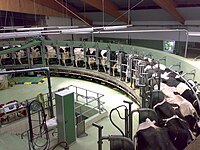
Photo from wikipedia
Abstract Heat stress is a serious threat to dairy cow health worldwide. N-carbamylglutamate (NCG), a novel feed additive, has been applied in dairy cow industry. However, the effects and mechanisms… Click to show full abstract
Abstract Heat stress is a serious threat to dairy cow health worldwide. N-carbamylglutamate (NCG), a novel feed additive, has been applied in dairy cow industry. However, the effects and mechanisms of NCG on dairy cows under heat stress are still unknown. A total of 48 Holstein dairy cows with similar days in milk (154 ± 13.6 d), parity (1-3), and body condition score were randomly divided into 4 groups of 12 animals each. Under heat stress, the cows were fed a TMR diet supplemented with 0 (control), 15, 20, 25 g of NCG/d per cow for 60 days. Milk production performance was recorded and serum parameters were examined. Meanwhile, metabolomics study of plasma based on liquid chromatography-mass spectrometry was also applied to investigate metabolites and pathways in response to NCG supplementation. Milk yield was increased but milk urea nitrogen was reduced by the NCG treatment. Addition of 15 g of NCG/d increased the milk protein percentage compared with the control. No effect of NCG was observed on dry matter intake, lactose percentage, milk fat percentage and somatic cell count. Serum glucose concentrations in cows fed with 15, 20, 25 g of NCG/d were 5.34 ± 0.312, 5.78 ± 0.473 and 5.54 ± 0.711 mmol/L, which were greater than those in the control (4.87 ± 0.367 mmol/L, P
Journal Title: Animal Feed Science and Technology
Year Published: 2021
Link to full text (if available)
Share on Social Media: Sign Up to like & get
recommendations!